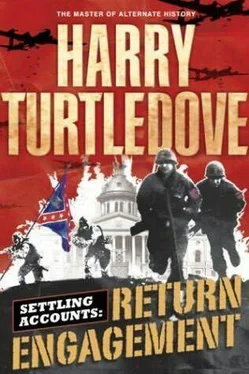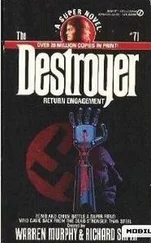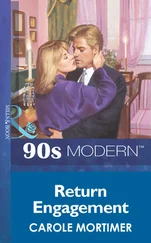Harry Turtledove - Return engagement
Здесь есть возможность читать онлайн «Harry Turtledove - Return engagement» весь текст электронной книги совершенно бесплатно (целиком полную версию без сокращений). В некоторых случаях можно слушать аудио, скачать через торрент в формате fb2 и присутствует краткое содержание. Жанр: История, на английском языке. Описание произведения, (предисловие) а так же отзывы посетителей доступны на портале библиотеки ЛибКат.
- Название:Return engagement
- Автор:
- Жанр:
- Год:неизвестен
- ISBN:нет данных
- Рейтинг книги:5 / 5. Голосов: 1
-
Избранное:Добавить в избранное
- Отзывы:
-
Ваша оценка:
- 100
- 1
- 2
- 3
- 4
- 5
Return engagement: краткое содержание, описание и аннотация
Предлагаем к чтению аннотацию, описание, краткое содержание или предисловие (зависит от того, что написал сам автор книги «Return engagement»). Если вы не нашли необходимую информацию о книге — напишите в комментариях, мы постараемся отыскать её.
Return engagement — читать онлайн бесплатно полную книгу (весь текст) целиком
Ниже представлен текст книги, разбитый по страницам. Система сохранения места последней прочитанной страницы, позволяет с удобством читать онлайн бесплатно книгу «Return engagement», без необходимости каждый раз заново искать на чём Вы остановились. Поставьте закладку, и сможете в любой момент перейти на страницу, на которой закончили чтение.
Интервал:
Закладка:
One slow, painful step at a time, Cincinnatus trudged over to Lucullus Wood's barbecue place. As usual, the smell made him drool blocks before he got there. Also as usual, Lucullus had customers both black and white. Freedom Party stalwarts might hate Negroes on general principles. That didn't mean they didn't know good barbecue when they sank their teeth into it.
The heat inside was terrific. Pig carcasses and great slabs of beef turned on spits over glowing hickory coals. Cincinnatus recognized one of the men turning the spits. "Can I see Lucullus?" he asked.
"Sure. Go on back," the turner answered. "He ain't got nobody with him now."
"Come in," Lucullus called when Cincinnatus knocked on the door. The barbecue cook had a hand in the top drawer of his desk. If Cincinnatus had been an unwelcome visitor, Lucullus probably could have given him a.45-caliber reception. But he smiled and relaxed and showed both hands. "Sit yourself down. What you got on your mind?"
Sitting down felt good-felt wonderful, in fact. Cincinnatus didn't like being on his feet. Baldly, he said, "Luther Bliss is back in town."
"My ass!" Lucullus exclaimed. "If he was, I reckon I'd known about it. How come you got the word ahead o' anybody else? I don't mean no disrespect, but you ain't nobody special."
"Never said I was," Cincinnatus answered. "But he was goin'into Goldblatt's drugstore when I was comin' out. I ain't nobody special, but I ain't nobody's fool, neither. I seen him, I recognized him-you better believe I recognized him-an' I talked to him. He got white hair now, but he ain't changed much otherwise. Luther Bliss, all right."
Lucullus drummed his plump fingers on the desktop. "Confederates catch him, he take a looong time to die."
"I know. I thought o' that." Cincinnatus nodded. "Man's a bastard, but he's a brave bastard. I always figured that."
"What the hell he doin' here?" Lucullus asked. Cincinnatus could only shrug. Lucullus waved away this motion. "I wasn't askin' you. Ain't no reason for you to know. But I ought to have. I got me connections up in the USA. They shoulda told me he was comin' back."
"Back in the days when Kentucky belonged to the United States, Bliss cared more about chasin' your daddy than about workin' with him," Cincinnatus said.
"Well, that's so, but times is different now. You gonna tell me times ain't different now?" Lucullus sent Cincinnatus a challenging stare.
Cincinnatus shook his head. "Not me. I oughta know. Still and all, though, Bliss, he works with white folks. He likely come down here for some special nasty trick or another, an' he got his people all lined up an' ready to go. I don't reckon he wants nobody else to know he's here."
"You got to be right about that." Lucullus eyed Cincinnatus again, this time speculatively. "You got to be lucky he don't decide to dispose o' you for knowin' who he is."
"He thought about it," Cincinnatus said. The sun hadn't been the only thing glowing in Luther Bliss' eyes. "He thought hard about it, I reckon. He probably figured no nigger's gonna give him away."
"He a damn fool if he think like that. Plenty o' niggers sell their mama for a dime." Lucullus held up a hand, pale palm out. "I don't mean you. I know better. You is what you is. But a lot o' niggers is just plain scared to death-an' the way things is goin', to death is just about the size of it."
"I ain't gonna do nothin' to help the Confederates an' the Freedom Party," Cincinnatus said. "Nothin', you hear me?"
"I done said I don't mean you. I said it, an' I meant it. You got to listen when you ain't talkin'," Lucullus said. "Bliss was at Goldblatt's, was he? He likely ain't stayin' real far from there, then."
"Mebbe," Cincinnatus said. "Never can tell with him, though. That there man taught the Mississippi to be twisty."
"You ain't wrong," Lucullus said. "And I is much obliged to you fo' passin' on what you seen. I should know that sort o' thing. Luther Bliss!" He whistled mournfully. "Who woulda thunk it?"
The cook heaved himself to his feet and led Cincinnatus out of the office. At his shouted order, one of the youngsters behind the counter gave Cincinnatus a barbecued-beef sandwich so thick, he could barely get his mouth around it. He walked back to his father's house engulfing it like a snake engulfing a frog. But all the barbecue in the world couldn't have taken the taste of Luther Bliss from his mouth.
Just swinging a hammer felt good to Chester Martin. Watching a house go up, making a house go up, seemed a lot more satisfying than tramping along the sidewalk with a picket sign on his shoulder. He'd never been thrilled about taking on a general's role in the war against capitalist oppression.
So he told himself, anyhow-and told himself, again and again. With patriotic zeal, one big builder after another had made his peace with the construction workers' union. Nobody could afford strikes any more. Everyone from the President on down was saying the same thing. People were actually acting as if they believed it, too. Love of country trumped love of class. That was one of the lessons of 1914, when international solidarity of the workers hadn't done a damn thing to stop the Great War. A generation of peace had let memories grow hazy. Now the truth came to light again.
Martin found himself quietly swearing at Harry T. Casson as he rode the trolley home from work one hot afternoon. The building magnate had known him better than he knew himself. Try as he would to get back to normal, to return to being an ordinary working man, he missed the class struggle, missed heading the proletariat's forces in that struggle. Was ordinary work enough after such a long, bruising fight?
When he got off the trolley a few blocks from his place, a newsboy on the corner was hawking the Daily Mirror-Los Angeles' leading afternoon paper-with shouts of, "Sabotage! Treason! Read all about it!"
That was a headline Chester would have expected from the Times. In fact, half a block away another newsboy was selling the afternoon edition of the Times with almost identical cries. In the Times, they were usually aimed at union organizers and other such subversives. Chester bought a copy of the Daily Mirror. That way, he didn't have to give the Times any of his money.
He discovered that the Daily Mirror-and, presumably, even the Times for once-meant their headlines literally. A U.S. offensive against the Confederates in Ohio had been blunted because Confederate sympathizers blew bridges, took down important road signs, and otherwise fouled things up. One of them had been caught in the act. He'd killed himself before U.S. forces could seize him and, perhaps, squeeze answers out of him.
"Fighting the enemy is hard enough. Fighting the enemy and our own people at the same time is ten times worse," an officer was quoted as saying. Right next to his bitter comment was a story about the secondary campaign in Utah. The Mormons were using lots of land mines against U.S. soldiers and U.S. barrels, making the advance toward Provo hideously expensive.
Chester almost walked past his own building. He folded the newspaper under one arm and thumped his forehead with the heel of his other hand. Then he went inside and went upstairs. He sniffed when he let himself into the apartment. "What smells good?" he called.
"It's a tongue," Rita answered from the kitchen. Chester smiled. When times were good, back in the 1920s, he would have turned up his nose at tongue. He and Rita had started eating it when times went sour. They'd kept on eating it afterwards because they both found they liked it. So did their son. Rita went on, "How did it go today?"
"All right, I guess." Chester did his best not to think about his discontent. To keep from flabbling about what he was doing, he flabbled about external things instead: "War news isn't very good."
Читать дальшеИнтервал:
Закладка:
Похожие книги на «Return engagement»
Представляем Вашему вниманию похожие книги на «Return engagement» списком для выбора. Мы отобрали схожую по названию и смыслу литературу в надежде предоставить читателям больше вариантов отыскать новые, интересные, ещё непрочитанные произведения.
Обсуждение, отзывы о книге «Return engagement» и просто собственные мнения читателей. Оставьте ваши комментарии, напишите, что Вы думаете о произведении, его смысле или главных героях. Укажите что конкретно понравилось, а что нет, и почему Вы так считаете.












